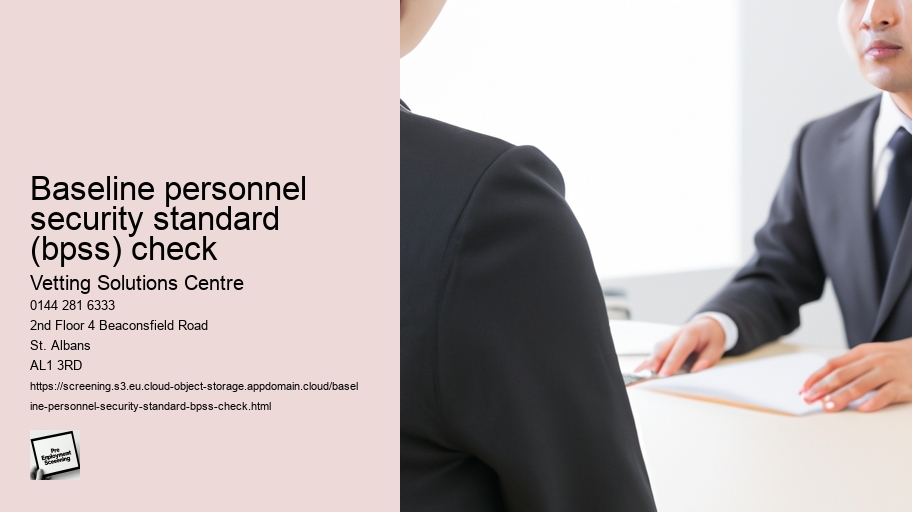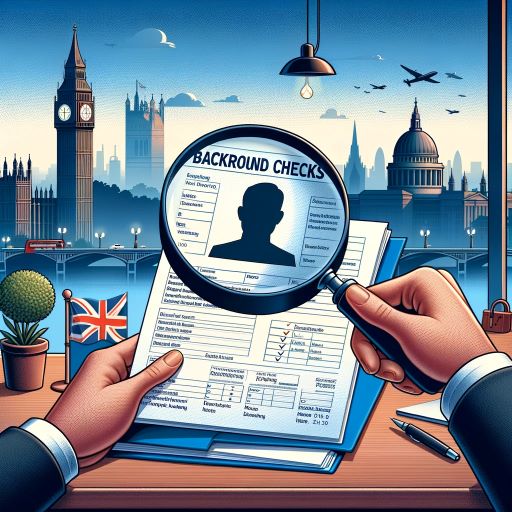

• Scotland:
Request Process Apply online or by post. Initiate your basic criminal record check request.
5. Preventing Unauthorized Access: By verifying identities and backgrounds, BPSS helps in preventing unauthorized access to sensitive information, thereby maintaining confidentiality and protecting critical assets.
Essentially, it involves a systematic approach to ensure that a business has conducted all necessary due diligence regarding candidate compliance. This includes implementing procedures and, when needed, incorporating checks by external parties. The specifics of the screening process can vary widely across organizations, influenced by the industry and the particular demands of the job role.
Step 3 Additional documents for Standard/Enhanced checks Individual Applicant
BPSS achieves this by verifying identities, employment histories, and criminal records, thereby contributing to maintaining confidentiality and integrity in sensitive positions.
The Baseline Personnel Security Standard (BPSS) and the Disclosure and Barring Service (DBS) check are both used in the United Kingdom for background checks, but they serve different purposes and involve different levels of scrutiny.
While both are forms of background checks, their specific purposes, scope, and usage differ significantly, tailored to meet various security and safety requirements in employment and roles of trust
The BS7858 check refers to the British Standard (BS) 7858, which provides a code of practice for the security screening of individuals employed in a security environment. This type of vetting process is specifically designed for positions where the integrity and reliability of personnel are of paramount importance due to their access to secure areas, sensitive information, or involvement in the security sector. The BS7858 screening is often required for:
Security Personnel: This includes individuals working as security guards, CCTV operators, bodyguards, and any other roles directly related to physical security services.
Alarm, Lock, and Safe Engineers: Professionals involved in the installation, maintenance, or repair of security systems, locks, and safes, where they have unsupervised access to secure or sensitive areas.
Keyholders: Employees who have access to keys or codes for commercial properties, potentially outside of regular business hours, necessitating a high level of trust.
Staff in the Security Sector: This can extend to various roles within companies that provide security services, including management and support staff who might have access to sensitive operational information.
Individuals with Access to Confidential Information: Although not exclusive to the security sector, employees in roles where they handle or have access to confidential data or assets might also undergo BS7858 screening, depending on their employer's policies and the nature of the information.
Employees in Critical National Infrastructure (CNI): While not always mandatory, individuals working in or with CNI sectors (like energy, telecommunications, and water services) might be screened to BS7858 standards due to the sensitive nature of their work.
As organizations adapt to evolving security needs, the implementation of BPSS is shifting towards a more continuous and allencompassing approach. Rather than relying solely on oneoff checks, there's a growing trend towards ongoing monitoring to guarantee that individuals maintain the required security standards over time. Many companies are recognizing the benefits of partnering with screening providers to establish robust and exhaustive screening programs specifically tailored to meet BPSS requirements.
The time needed for thirdparty checks to come back varies depending on the provider.
Application Process Steps Required Documentation Applicant Type

In the UK, BPSS is vital for verifying identities and protecting sensitive info in background checks. It guarantees only trustworthy individuals qualify for specific roles. This process is essential to uphold security standards and meet legal obligations. If you want to understand its full significance and how it impacts national security, continue exploring its role in background checks in the UK.
Individuals can also obtain their own basic check for personal use or when requested by an employer. Additional considerations apply for individuals living abroad or selfemployed individuals seeking background checks.
Verifying identities and records Maintains confidentiality and integrity

1. Legal Adherence: By ensuring compliance, you mitigate the risks of legal implications and penalties associated with noncompliant hiring practices.
These checks aren't just a formality but a necessary step in mitigating risks and ensuring that only individuals with the right intentions and qualifications are entrusted with specific roles. Whether you're a civil servant, a member of the armed forces, a government contractor, or someone needing security clearance, the BPSS process is essential for upholding security standards and meeting legal obligations. Embracing the significance and implementation of BPSS checks is critical for upholding personnel security and adhering to regulatory demands in the UK.
• Financial burdens from recruiting and training unfit candidates
• Conducting thorough ID verification to guarantee the identity of applicants.
Employers cover costs and require different types of checks based on role requirements. DBS checks involve various stages like verification and authentication, aiding in making safe hiring decisions. Get a deeper insight into the eligibility, process, and significance of preemployment screening.
• Unspent and spent convictions are detailed.

2. Legal Consequences: Employers who knowingly hire individuals without the right to work can face criminal charges and imprisonment for up to 5 years. Such severe legal repercussions can tarnish the reputation of the organization and hinder future operations.
Key Differences: Bs7858:2012 Vs. Bs7858:2019 , Shifting from the focus on BS7858 security screening standards in the past, the key differences between BS7858:2012 and BS7858:2019 highlight significant changes in background check requirements and processes.
Social media checks have also become increasingly important, with a vast majority of companies incorporating them into their recruitment process.
